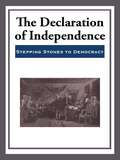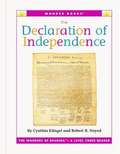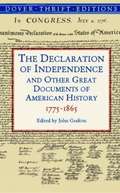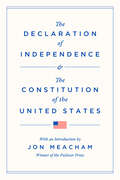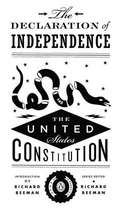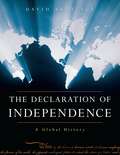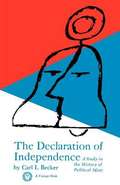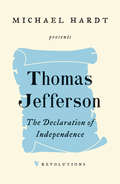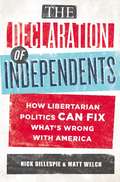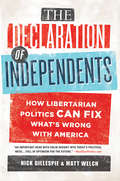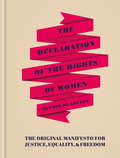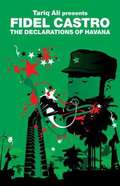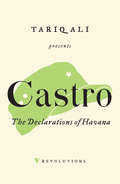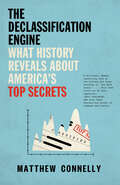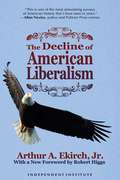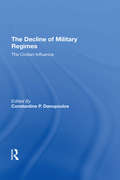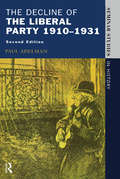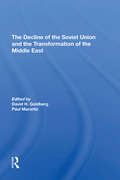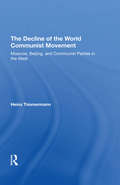- Table View
- List View
The Declaration of Independence
by Thomas JeffersonThe Declaration of Independence is considered to be one of the greatest documents of all time. The central section of the declaration is a ringing assertion that every human being has an equal right to life, liberty, and the pursuit of happiness. These are the words that have built your nation and keep it strong. <P><P>[This text is listed as an example that meets Common Core Standards in English language arts in grades 11-12 at http://www.corestandards.org.]
The Declaration of Independence (Wonder Books Level 3 U S History)
by Cynthia Klingel Robert B. Noyed"The Declaration of Independence is an important piece of writing in American history. It was written in 1776. It is the basis for America's government and laws." This easy to read book tells the story of the writing of The Declaration of Indepencence. A fine book for a book report!
The Declaration of Independence [Approaching Level, Grade 1]
by Barbara KanninenNIMAC-sourced textbook
The Declaration of Independence and God
by Owen Anderson'Self-evident truths' was a profound concept used by the drafters of the American Declaration of Independence to insist on their rights and freedom from oppressive government. How did this Enlightenment notion of self-evident human rights come to be used in this historic document and what is its true meaning? In The Declaration of Independence and God, Owen Anderson traces the concept of a self-evident creator through America's legal history. Starting from the Declaration of Independence, Anderson considers both challenges to belief in God from thinkers like Thomas Paine and American Darwinists, as well as modifications to the concept of God by theologians like Charles Finney and Paul Tillich. Combining history, philosophy and law in a unique focus, this book opens exciting new avenues for the study of America's legal history.
The Declaration of Independence and Other Great Documents of American History, 1775-1865
by John GraftonThirteen compelling and influential documents: Patrick Henry's "Give Me Liberty or Give Me Death," Declaration of Independence, The Constitution of the United States, James Madison's The Federalist, George Washington's First Inaugural Address, The Monroe Doctrine, Lincoln's First Inaugural Address, The Emancipation Proclamation, Gettysburg Address, and more.
The Declaration of Independence and the Constitution of the United States
by Jon Meacham#1 New York Times bestselling author Jon Meacham introduces America's essential founding documents in an elegant, readable, and timeless volume.In the winter of 1860–1861, facing the prospect of secession and civil war, President Abraham Lincoln held fast to the founding promise of the now-imperiled United States of America. The Declaration of Independence and the Constitution had forged the nation, and Lincoln intended to defend them. But even more importantly, Lincoln saw &“something back of these, entwining itself more closely about the human heart. That something is the principle of &‘Liberty to all.&’&”That principle remains as vital today as it has been throughout the first 250 years of our nation&’s history. Presented here with an introduction by bestselling American historian and biographer Jon Meacham, the Declaration of Independence and the Constitution of the United States of America are both timeless and timely, offering a window into the complex poltical world of the nation's founders—and important lessons for our own. As Meacham writes, &“If America is to be America, the foundational documents reprinted here must be not theoretical but tactile, not quaint but vivid, not dead but alive.&”
The Declaration of Independence and the United States Constitution
by Richard BeemanThe principal founding documents of the United States government Penguin presents a series of six portable, accessible, and--above all--essential reads from American political history, selected by leading scholars. Series editor Richard Beeman, author of The Penguin Guide to the U.S. Constitution, draws together the great texts of American civic life to create a timely and informative mini-library of perennially vital issues. Whether readers are encountering these classic writings for the first time, or brushing up in anticipation of the 50th anniversary of the Civil Rights Act, these slim volumes will serve as a powerful and illuminating resource for scholars, students, and civic-minded citizens. In one portable volume, with accessible annotations and modernizing commentary throughout, Richard Beeman presents The Declaration of Independence and the United States Constitution. Beeman has created a fascinating apparatus for understanding the most important document in American history--and why it's as central in the America of today as it was in creation of the country.
The Declaration of Independence: A Global History
by David ArmitageNot only did the Declaration announce the entry of the United States onto the world stage, it became the model for other countries to follow. This unique global perspective demonstrates the singular role of the United States document as a founding statement of our modern world.
The Declaration of Independence: A Study in the History of Political Ideas
by Carl BeckerCarl Becker's important study is an analysis of the concepts expressed in the Declaration of Independence. Here is a lucid explanation of what the Declaration really is, what views it sets forth, where those views arose, and how they have been accepted or modified by succeeding generations. A book that every American should read.
The Declaration of Independence: Thomas Jefferson's Manuscript Draft From The Collections Of The American Philosophical Society (Books Of American Wisdom Ser.)
by Thomas JeffersonCo-author of the groundbreaking Empire and Multitude, Michael Hardt examines the Declaration of Independence and other texts by Jefferson, arguing that his powerful concept of democracy provides a biting critique of the current American administration. Introducing this collection of Jefferson&’s writings, Michael Hardt makes a powerful case for re-examining the foundational writings of this American revolutionary in order to reignite the dialogue that first conceived of a &“land of the free.&”
The Declaration of Independents
by Nick Gillespie Matt WelchEverywhere in America, the forces of digitization, innovation, and personalization are expanding our options and bettering the way we live. Everywhere, that is, except in our politics. There we are held hostage to an eighteenth century system, dominated by two political parties whose ever-more-polarized rhetorical positions mask a mutual interest in maintaining a stranglehold on power.The Declaration of Independents is a compelling and extremely entertaining manifesto on behalf of a system better suited to the future--one structured by the essential libertarian principles of free minds and free markets. Gillespie and Welch profile libertarian innovators, identify the villains propping up the ancien regime, and take aim at do-something government policies that hurt most of those they claim to protect. Their vision will resonate with a wide swath of frustrated citizens and young voters, born after the Cold War's end, to whom old tribal allegiances, prejudices, and hang-ups about everything from hearing a foreign language on the street to gay marriage to drug use simply do not make sense.
The Declaration of Independents
by Nick Gillespie Matt WelchEverywhere in America, the forces of digitization, innovation, and personalization are expanding our options and bettering the way we live. Everywhere, that is, except in our politics. There we are held hostage to an eighteenth century system, dominated by two political parties whose ever-more-polarized rhetorical positions mask a mutual interest in maintaining a stranglehold on power. The Declaration of Independents is a compelling and extremely entertaining manifesto on behalf of a system better suited to the future--one structured by the essential libertarian principles of free minds and free markets. Gillespie and Welch profile libertarian innovators, identify the villains propping up the ancien regime, and take aim at do-something government policies that hurt most of those they claim to protect. Their vision will resonate with a wide swath of frustrated citizens and young voters, born after the Cold War's end, to whom old tribal allegiances, prejudices, and hang-ups about everything from hearing a foreign language on the street to gay marriage to drug use simply do not make sense.
The Declaration of Independents: How Libertarian Politics Can Fix What's Wrong with America
by Nick Gillespie Matt WelchWhy do we have more choices at the local coffee shop than we do at the ballot box?
The Declaration of the Rights of Women: The Originial Manifesto for Justice, Equality and Freedom
by Olympe De GougesOlympe de Gouges was the most important fighter for women's rights you've never heard of. An activist and writer in revolutionary Paris, she published 'The Declaration of the Rights of Women' in 1791, and was beheaded two years later, her articulate demands for equality proving too much for their time.<P><P>Over one hundred and fifty years later, the key statements of her declaration were internationally endorsed by the United Nations in its Declaration on the Elimination of Discrimination Against Women, which in turn went on to be legally recognized by nearly every country in the world. <P>This volume presents both of these key texts along with enlightening and inspiring commentary from a host of powerful women, from Virginia Woolf to Hillary Clinton.
The Declaration of the Rights of Women: The Originial Manifesto for Justice, Equality and Freedom
by Olympe de GougesOlympe de Gouges was the most important fighter for women's rights you've never heard of. An activist and writer in revolutionary Paris, she published 'The Declaration of the Rights of Women' in 1791, and was beheaded two years later, her articulate demands for equality proving too much for their time.Over one hundred and fifty years later, the key statements of her declaration were internationally endorsed by the United Nations in its Declaration on the Elimination of Discrimination Against Women, which in turn went on to be legally recognized by nearly every country in the world. This volume presents both of these key texts along with enlightening and inspiring commentary from a host of powerful women, from Virginia Woolf to Hillary Clinton.
The Declarations of Havana
by Fidel CastroIn response to the American administrations attempt to isolate Cuba, Fidel Castro delivered a series of speeches designed to unify Latin American society. Renowned radical writer and activist Tariq Ali provides a searing analysis of the relevance of Castro's message for today.
The Declarations of Havana (Revolutions Ser.)
by Tariq Ali Fidel CastroIn response to the American administration’s attempt to isolate Cuba, Fidel Castro delivered a series of speeches designed to radicalize Latin American society. As Latin America experiences more revolutions in Venezuela and Bolivia, and continues to upset America’s plans for neo-liberal imperialism, renowned radical writer and activist Tariq Ali provides a searing analysis of the relevance of Castro’s message for today.
The Declassification Engine: What History Reveals About America's Top Secrets
by Matthew ConnellySHORTLISTED FOR THE CUNDHILL HISTORY PRIZE • Every day, thousands of new secrets are created by the United States government. What is all this secrecy really for? And whom does it benefit?&“A brilliant, deeply unsettling look at the history and inner workings of &‘the dark state'.... At a time when federal agencies are increasingly classifying or destroying documents with historical significance, this book could not be more important.&” —Eric Schlosser, New York Times best-selling author of Command and ControlBefore World War II, transparent government was a proud tradition in the United States. In all but the most serious of circumstances, classification, covert operations, and spying were considered deeply un-American. But after the war, the power to decide what could be kept secret proved too tempting to give up. Since then, we have radically departed from that open tradition, allowing intelligence agencies, black sites, and classified laboratories to grow unchecked. Officials insist that only secrecy can keep us safe, but its true costs have gone unacknowledged for too long. Using the latest techniques in data science, historian Matthew Connelly analyzes a vast trove of state secrets to unearth not only what the government really did not want us to know but also why they didn&’t want us to know it. Culling this research and carefully examining a series of pivotal moments in recent history, from Pearl Harbor to drone warfare, Connelly sheds light on the drivers of state secrecy— especially incompetence and criminality—and how rampant overclassification makes it impossible to protect truly vital information. What results is an astonishing study of power: of the greed it enables, of the negligence it protects, and of what we lose as citizens when our leaders cannot be held to account. A crucial examination of the self-defeating nature of secrecy and the dire state of our nation&’s archives, The Declassification Engine is a powerful reminder of the importance of preserving the past so that we may secure our future.
The Decline Of American Liberalism
by Arthur A. EkirchFrom the Revolutionary War and World Wars I and II to the Great Depression and civil rights battles, this chronicle takes a historical look at how principles such as individual liberty and democratic rule have weathered the last few centuries. The growth of state empowerment and its effect on autonomy and the economy is also discussed.
The Decline Of Military Regimes: The Civilian Influence
by James Brown Constantine P Danopoulos Robin A Remington Claude WelchMany generous people deserve special thanks for their assistance in the preparation and completion of this project. I wish to express my gratitude to each of the contributors for agreeing to tackle a difficult and inherently controversial subject. I am only sorry that C.I. Eugene Kim did not live long enough to see the fruits of his labor; he will be sorely missed by all of us who knew him. The Third World and the military do not respond easily to scrutiny by social scientists. Many colleagues and referees read all or part of the manuscript; I am grateful to Professors Richard Lane, Roy Christman, and Bob Kumamoto of San Jose State University and Timothy Lukes of Santa Clara University, who offered numerous helpful• comments. My parents, Panos and Athanasia Danopoulos, my brother George and his wife, Niki, my aunt Areti Paraskevopoulou, and my koumbaro George Nikoletopoulos have provided boundless moral support. Polly Taylor's expert typing and coding made the preparation of the typescript possible. Finally, my wife, Vickie, and our two sons, Panos and Andreas, deserve special thanks for their willingness to endure the long hours that writing and manuscript preparation entail. Though helpful, none of these people bear any responsibility for any problems associated with this volume. Responsibility for the accuracy and scholastic quality of what follows belongs to the contributors and myself.
The Decline Of The Liberal Party 1910-1931 (Seminar Studies)
by Paul AdelmanPaul Adelman seeks to explain the Liberal Party's dramatic transformation in political fortune. This clear, objective up-to-date account of the history of the Liberal Party covers the key period, 1910-1931. Focusing on liberal decline and drawing upon the different views forwarded by historians to account for this phenomenon, it discusses liberal decline before World War 1, the impact of the war on the liberals and the divisions that grew in the party after December 1916 between followers of Asquith and Lloyd George. A number of general factors are also covered, the impact of social and economic change, the effects of the Reform Act of 1918 and the rise of the Labour party. An ideal text for A-level and undergraduate students of history and politics.
The Decline Of The Soviet Union And The Transformation Of The Middle East
by Stephen Page David Howard Goldberg Paul Marantz Stephen GotowickiFor more than three decades, the Soviet Union was a major force in the Middle East, and superpower rivalry exacerbated many of the conflicts endemic to the region. The end of the Cold War and the collapse of the Soviet Union have fundamentally altered the rules of the game in Middle East politics, producing a new fluidity in the region, new diplomatic alignments, and new opportunities for peace. The contributors place recent developments in historical and political context, analyzing changes in Soviet Middle East policy under Gorbachev as well as evaluating developments since the demise of the Soviet Union. The evolution of Moscow's policy toward the Arab states, Israel, the P.L.O., and the U.N. is given special attention. The contributors also examine the emergence of Islamic fundamentalism in the new states of Central Asia and weigh the potential implications of this development for the Middle East. In addition, they discuss security issues related to the transfer of military technology from former Soviet republics to the countries of the Middle East.
The Decline Of The World Communist Movement: Moscow, Beijing, And Communist Parties In The West
by Heinz TimmermannInternational Communism today is split on a number of ideological and political issues and is incapable of the kind of unified action implied by the term “movement.†So argues Heinz Timmermann in this assessment of the current state of world Communism. Dr. Timmermann discusses the historical concept of a world Communist movement in connection with the USSR and China. Focusing on Communism in the West, he examines such diverse groups as the Communist parties in Italy, France, Portugal, Cyprus, Chile, and Japan. Communist parties in the West are increasingly adjusting their policies to better fit their own cultures, and the author links this independence to the emphasis the Soviet Union’s Communist Party has been placing on the specifically Russian character of the October Revolution and Soviet state interests. Apparently, Moscow is now showing some flexibility in its response to tendencies toward differentiation and pluralism within the system of Communist parties. Gorbachev is less concerned with ideological orthodoxy than with Communists effectively supporting Soviet foreign policy. The author argues that by acceding to the concept of “unity in diversity,†Gorbachev is signaling that the Soviet leadership is willing to look beyond the myth of a world Communist movement.
